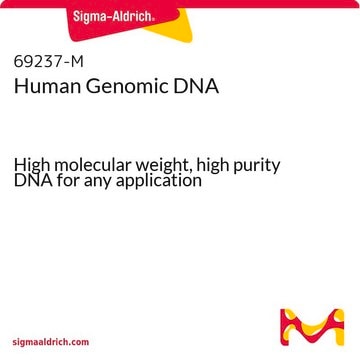05480647001
Roche
ADN COT humain
solution, pkg of 1 mg
Synonyme(s) :
COT Human DNA, DNA
About This Item
Produits recommandés
Source biologique
human placenta (DNA)
Niveau de qualité
Qualité
fluorometric grade
Forme
solution
Conditionnement
pkg of 1 mg
Fabricant/nom de marque
Roche
Concentration
1.0-1.5 mg/mL
Impuretés
HCV/HBV, none detected
HIV 1/2, none detected
Couleur
colorless
Solubilité
water: miscible
Température de stockage
−20°C (−15°C to −25°C)
Vous recherchez des produits similaires ? Visite Guide de comparaison des produits
Description générale
Application
- Nucleic acid labeling and detection
- DNA Microarray applications such as comparative genome hybridization and sequence capture
- Complex hybridization of human nucleic acids like FISH
Caractéristiques et avantages
- Improve specificity by blocking unspecific nucleic acid motifs using high concentrations of double-stranded, repetitive, human DNA.
- Achieve consistent and reliable results using fluorometrically quantified COT Human DNA, for preferentially detecting dsDNA.
- Use COT Human DNA that has been tested using DNA microarrays and comparative genome hybridization (CGH).
Qualité
For quality assessment in the CGH application, target sequences located on the X-chromosome are compared in male and female genomic DNA samples. The donor material for this product was tested for HBs antigen and for the presence of antibodies to HIV-1, HIV-2, HCV, and found to be negative.
Séquence
Forme physique
Stockage et stabilité
Autres remarques
Code de la classe de stockage
12 - Non Combustible Liquids
Classe de danger pour l'eau (WGK)
nwg
Point d'éclair (°F)
No data available
Point d'éclair (°C)
No data available
Certificats d'analyse (COA)
Recherchez un Certificats d'analyse (COA) en saisissant le numéro de lot du produit. Les numéros de lot figurent sur l'étiquette du produit après les mots "Lot" ou "Batch".
Déjà en possession de ce produit ?
Retrouvez la documentation relative aux produits que vous avez récemment achetés dans la Bibliothèque de documents.
Notre équipe de scientifiques dispose d'une expérience dans tous les secteurs de la recherche, notamment en sciences de la vie, science des matériaux, synthèse chimique, chromatographie, analyse et dans de nombreux autres domaines..
Contacter notre Service technique






